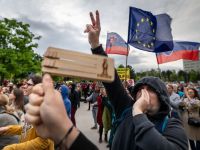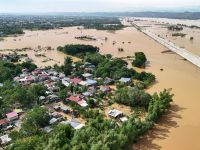Israeli aircraft flew over southern Lebanon again Tuesday morning, a day after the most intense overflights of the region in a year, police and AFP correspondents reported, sparking protests from Beirut and the United Nations.
Lebanese Foreign Minister Mahmud Hammud urged the United States and the United Nations to "put an end to the Israeli violations of Lebanese airspace and the blue line," drawn by the UN to separate Lebanon and Israel, a government source told AFP.
UN Secretary General Kofi Annan's special representative in Lebanon, Staffan de Mistura, called in a statement on "the Israeli authorities to stop their violations of the blue line."
"Nothing justifies any violation of the blue line," said the statement, which said 35 Israeli fighters and five helicopters had infringed on Lebanese air space on Monday, going as far as Beirut.
Mistura also stressed "the need to show restraint at a time of high tension in the region."
The United Nations has repeatedly called on Israel to stop violating Lebanese airspace, counting the forays as breaches of the "blue line", demarcated after the May 2000 Israeli pullout from southern Lebanon.
For more than six hours Monday night, fighter-bombers, combat helicopters and unmanned reconnaissance drones were sighted above Sidon, Tyre and the Bekaa Valley, simulating raids, breaking the sound barrier and firing flares.
The Israeli aircraft drew heavy but ineffective fire from the air defenses of the Lebanese army and the Shiite Muslim fundamentalist Hezbollah, which spearheaded the resistance that led to Israel's troop withdrawal.
Israeli overflights have become an almost daily occurrence since October 22, when Hezbollah guerrillas bombarded positions which Israel has retained in the Shebaa Farms area.
But police reported no serious incident along the Israeli-Lebanese border on Monday that could explain the size of the Israeli operation -- the largest in a year -- that came on the second day of Eid al-Fitr holidays marking the end of the Muslim holy month of Ramadan.
Analysts and diplomats said this latest military muscle flexing by the Jewish state was a warning to Beirut and Damascus, as well as to the groups they support, to stay out of the Israeli-Palestinian conflict.
Following the September 11 attacks against the United States, Washington's request that Lebanon and Syria freeze the assets of groups deemed to have terrorist activities, including Hezbollah and radical Palestinian groups, was rejected on the grounds that they were resistance movements and not terrorist organizations.
But Lebanese President Emile Lahoud said Tuesday Lebanon, which is politically dominated by Syria, would not change its position.
"The aim of these violations is known and will not alter Lebanon's positions, its choices and its national principles," the presidency said in a statement.
Lahoud branded the overflights "violations of international conventions and customs," adding that they were an "aggression against Lebanon sovereignty and territorial integrity."
He complained that the Israeli jets had "targeted civilians, spreading panic among the population, including children who were celebrating" Eid -- AFP
© 2001 Al Bawaba (www.albawaba.com)







